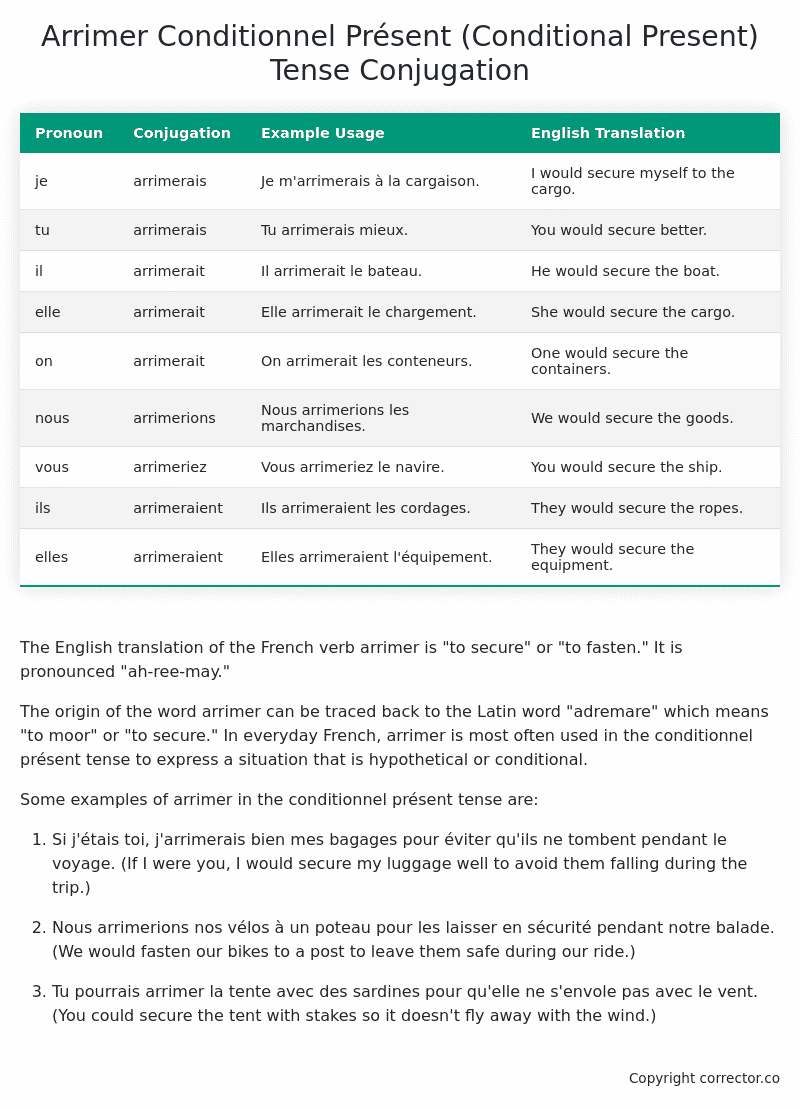Conditionnel Présent (Conditional Present) Tense Conjugation of the French Verb arrimer
Introduction to the verb arrimer
The English translation of the French verb arrimer is “to secure” or “to fasten.” It is pronounced “ah-ree-may.”
The origin of the word arrimer can be traced back to the Latin word “adremare” which means “to moor” or “to secure.” In everyday French, arrimer is most often used in the conditionnel présent tense to express a situation that is hypothetical or conditional.
Some examples of arrimer in the conditionnel présent tense are:
-
Si j’étais toi, j’arrimerais bien mes bagages pour éviter qu’ils ne tombent pendant le voyage. (If I were you, I would secure my luggage well to avoid them falling during the trip.)
-
Nous arrimerions nos vélos à un poteau pour les laisser en sécurité pendant notre balade. (We would fasten our bikes to a post to leave them safe during our ride.)
-
Tu pourrais arrimer la tente avec des sardines pour qu’elle ne s’envole pas avec le vent. (You could secure the tent with stakes so it doesn’t fly away with the wind.)
Table of the Conditionnel Présent (Conditional Present) Tense Conjugation of arrimer
| Pronoun | Conjugation | Example Usage | English Translation |
|---|---|---|---|
| je | arrimerais | Je m’arrimerais à la cargaison. | I would secure myself to the cargo. |
| tu | arrimerais | Tu arrimerais mieux. | You would secure better. |
| il | arrimerait | Il arrimerait le bateau. | He would secure the boat. |
| elle | arrimerait | Elle arrimerait le chargement. | She would secure the cargo. |
| on | arrimerait | On arrimerait les conteneurs. | One would secure the containers. |
| nous | arrimerions | Nous arrimerions les marchandises. | We would secure the goods. |
| vous | arrimeriez | Vous arrimeriez le navire. | You would secure the ship. |
| ils | arrimeraient | Ils arrimeraient les cordages. | They would secure the ropes. |
| elles | arrimeraient | Elles arrimeraient l’équipement. | They would secure the equipment. |
Other Conjugations for Arrimer.
Le Present (Present Tense) Conjugation of the French Verb arrimer
Imparfait (Imperfect) Tense Conjugation of the French Verb arrimer
Passé Simple (Simple Past) Tense Conjugation of the French Verb arrimer
Passé Composé (Present Perfect) Tense Conjugation of the French Verb arrimer
Futur Simple (Simple Future) Tense Conjugation of the French Verb arrimer
Futur Proche (Near Future) Tense Conjugation of the French Verb arrimer
Plus-que-parfait (Pluperfect) Tense Conjugation of the French Verb arrimer
Passé Antérieur (Past Anterior) Tense Conjugation of the French Verb arrimer
Futur Antérieur (Future Anterior) Tense Conjugation of the French Verb arrimer
Subjonctif Présent (Subjunctive Present) Tense Conjugation of the French Verb arrimer
Subjonctif Passé (Subjunctive Past) Tense Conjugation of the French Verb arrimer
Subjonctif Imparfait (Subjunctive Imperfect) Tense Conjugation of the French Verb arrimer
Subjonctif Plus-que-parfait (Subjunctive Pluperfect) Tense Conjugation of the French Verb arrimer
Conditionnel Présent (Conditional Present) Tense Conjugation of the French Verb arrimer (this article)
Conditionnel Passé (Conditional Past) Tense Conjugation of the French Verb arrimer
L’impératif Présent (Imperative Present) Tense Conjugation of the French Verb arrimer
L’infinitif Présent (Infinitive Present) Tense Conjugation of the French Verb arrimer
Struggling with French verbs or the language in general? Why not use our free French Grammar Checker – no registration required!
Get a FREE Download Study Sheet of this Conjugation 🔥
Simply right click the image below, click “save image” and get your free reference for the arrimer Conditionnel Présent tense conjugation!

Arrimer – About the French Conditionnel Présent (Conditional Present) Tense
Formation
Common Everyday Usage Patterns
Expressing Polite Requests
Expressing Hypothetical Situations
Expressing Doubt or Uncertainty
Interactions with Other Tenses
Present Tense
Past Tense
Future Tense
Conditional Perfect
Summary
Want More?
I hope you enjoyed this article on the verb arrimer. Still in a learning mood? Check out another TOTALLY random French verb conjugation!


